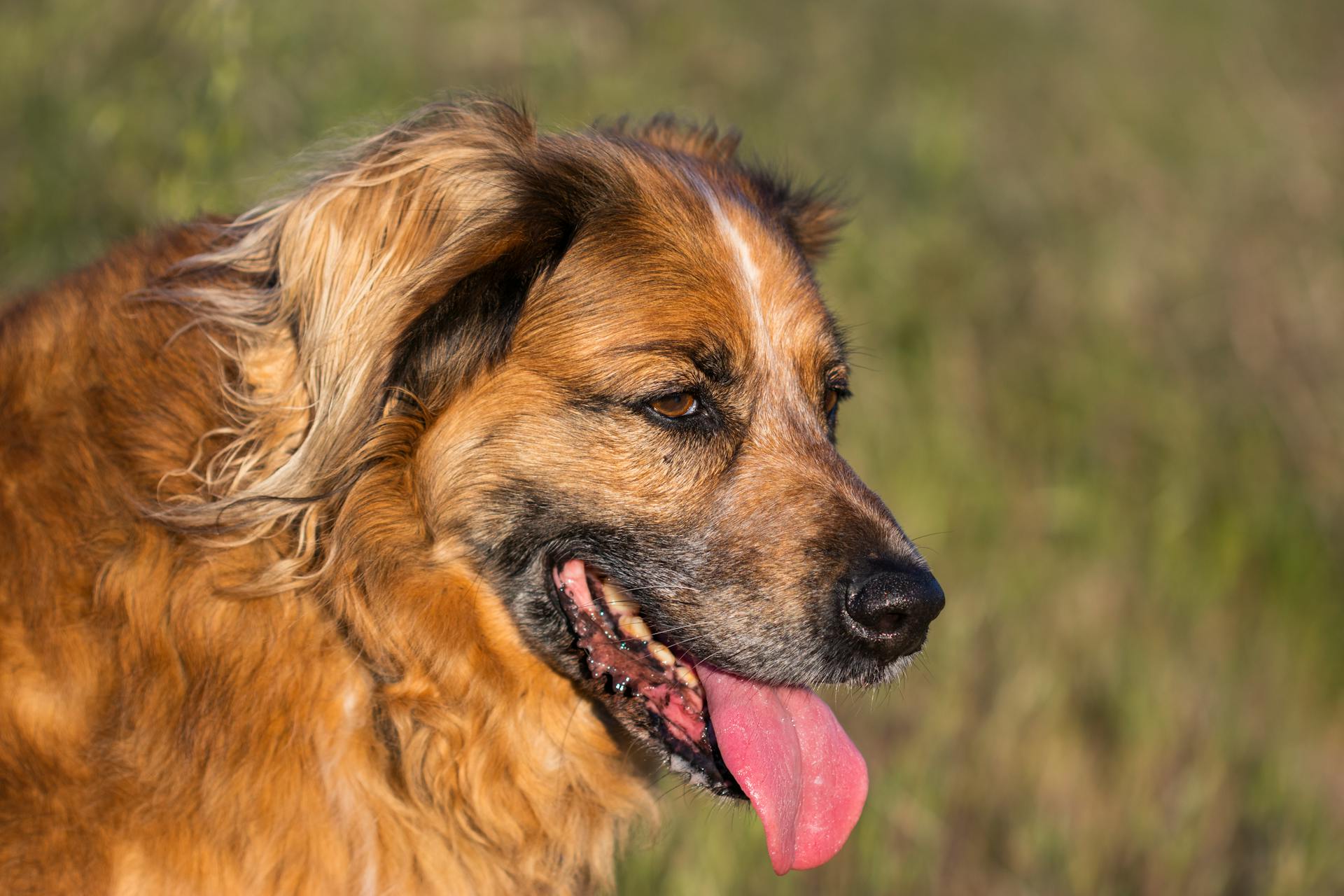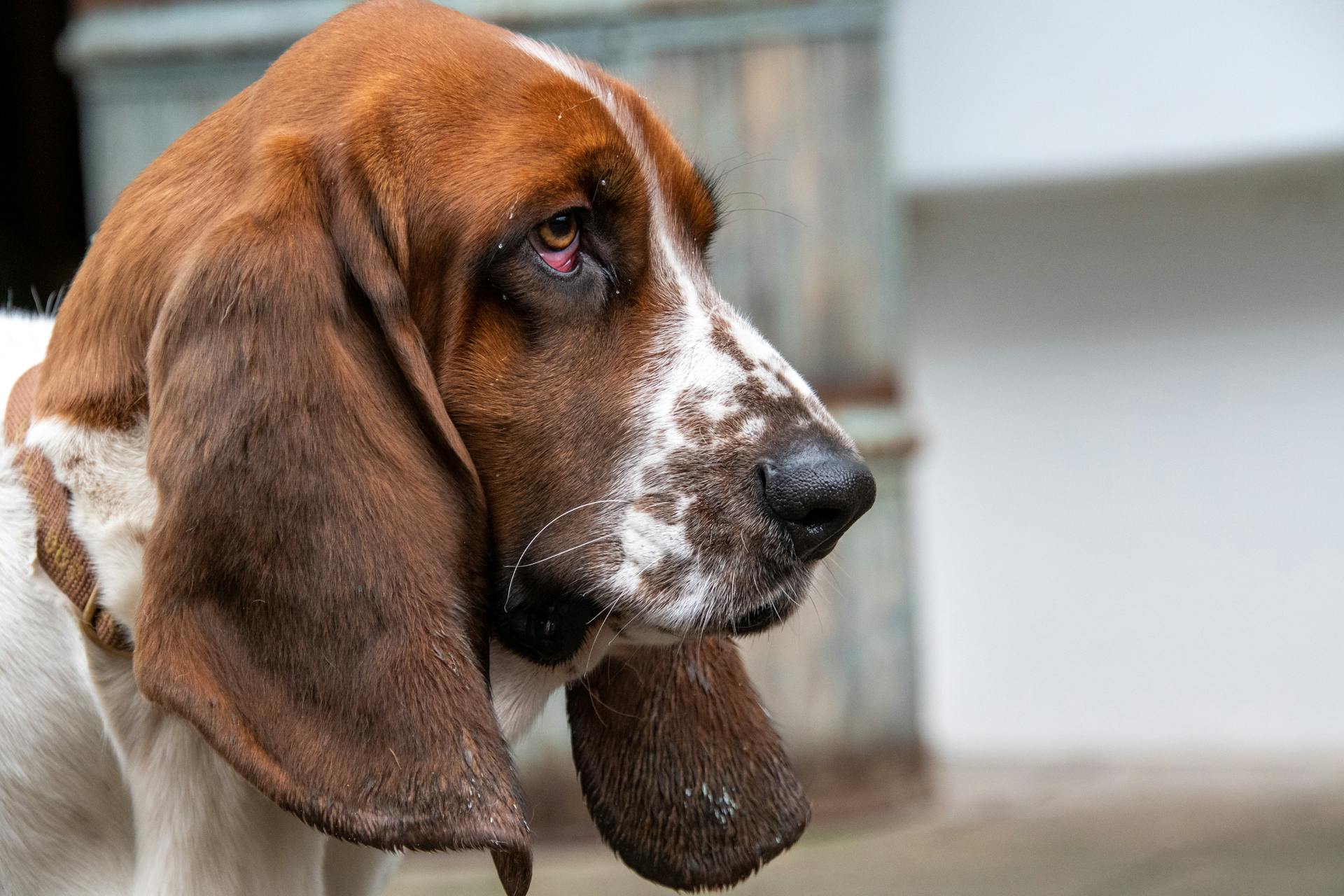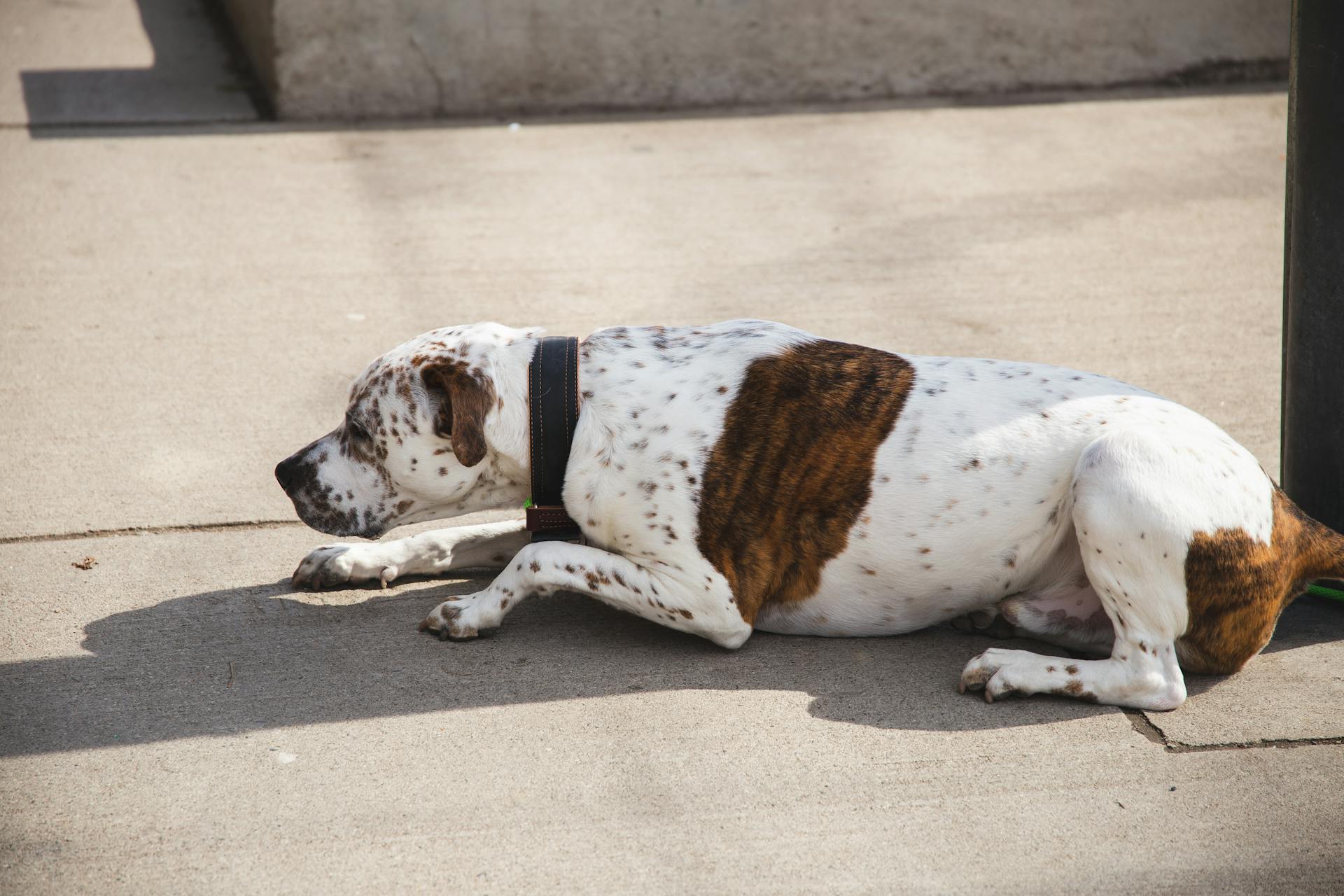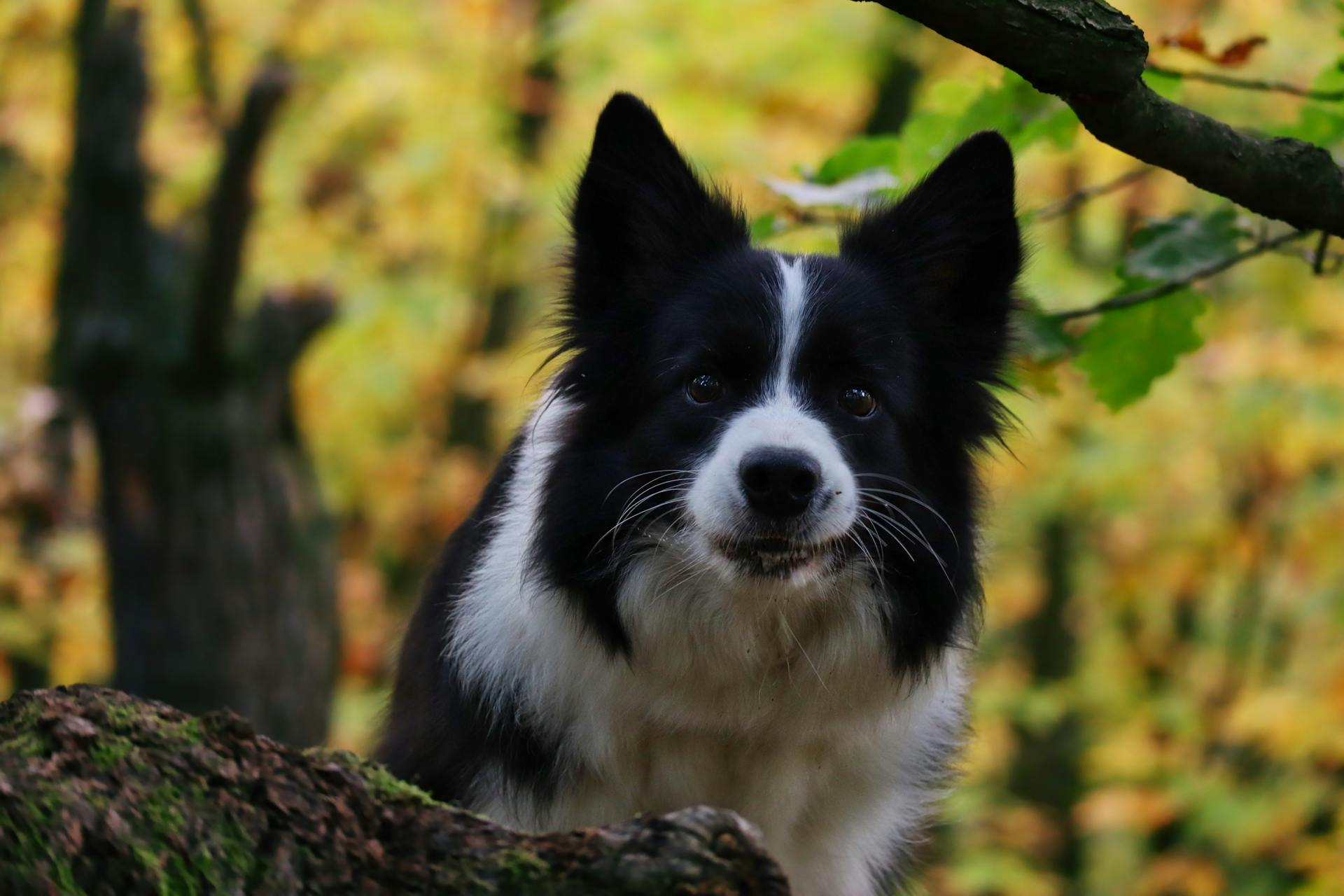
Getting a Plott Hound puppy is a big decision, and it's essential to understand what to expect. Plott Hound puppies are born with their eyes closed, and they typically open them around 10-14 days old.
They're also born with their ears folded back, which will start to perk up around 2-3 weeks old. This is completely normal and a sign of their growth and development.
The first few weeks of a Plott Hound puppy's life are crucial for socialization. This is the time when they learn to interact with their littermates and humans, which will shape their personality and behavior later on.
As you prepare to bring your Plott Hound puppy home, remember that they'll need plenty of attention, exercise, and training to grow into a well-behaved adult dog.
Recommended read: Black Mouth Cur Puppy 8 Weeks
Physical Characteristics
The Plott hound is a beautiful breed with a distinct appearance. Its brindle-colored coat is a key characteristic of the breed.
The Plott hound's body is well-proportioned, with a deep and moderately broad chest that gives it adequate lung space. Ribs are nicely sprung and taper to a graceful tuck-up at the flank.
The breed's hindquarters are strong and muscular, with smooth, round hips and moderate angulation at the stifle and hock joints. The legs are short and straight from the hock to the heel.
General Appearance
The Plott Hound is a beautiful breed with a strong build, suggesting its capacity for speed, stamina, and endurance.
Its brindle colored coat is a distinct feature of the breed.
The Plott Hound's height ranges from 20 to 25 inches for males and 20 to 23 inches for females.
Males typically weigh between 50 to 60 pounds, while females weigh between 40 to 55 pounds.
The breed's overall proportion is square or slightly longer than tall, with a broad, well-muscled back and nicely sprung ribs.
Hindquarters
The hindquarters of this breed are quite impressive. Hips are smooth, round, proportionately wide and well muscled.
Legs are a key feature, with strong and muscular upper parts. They have moderate angulation at the stifle and hock joints.
The legs are short and straight from the hock to the heel. They should never be cow hocked.
Characteristics
The Plott Hound is an active breed, known for its speed and endurance. They have a strong build and a distinct brindle colored coat.
One of the key characteristics of the Plott Hound is its high energy level, which makes it a great fit for an active lifestyle. They require regular exercise to stay happy and healthy.
Plott Hounds are also known for their intelligence and trainability, with a medium level of trainability. This means they can learn quickly with positive reinforcement, but may require more patience and consistency.
Here are some key characteristics of the Plott Hound:
Plott Hounds are generally good with their family, but may be wary of strangers. They require proper socialization to get along with other dogs, and may view smaller household pets as prey.
Breed Overview
The Plott Hound is a medium-sized breed with a muscular build, weighing between 40 to 60 pounds. They typically stand between 20 to 25 inches tall at the shoulder.
Their coat comes in a variety of colors, including any shade of brindle, black, buckskin, or maltese with/without black saddle, gray muzzle and jaw, white chest and feet, or brindle trim.
The breed's height and weight vary between males and females, with males standing 20 to 25 inches tall and weighing 50 to 60 pounds, while females stand 20 to 23 inches tall and weigh 40 to 55 pounds.
Here's a breakdown of the breed's physical characteristics:
Their lifespan is relatively long, ranging from 12 to 14 years.
Care and Maintenance
Plott hound puppies require regular nail trimming to prevent overgrowth. This is especially important if they don't naturally wear down their nails.
Their coats are relatively low-maintenance, but they can develop an unpleasant odor if not properly cared for. Occasional baths will help keep them smelling fresh.
Daily activity is essential for plott hound puppies, as they are energetic and intelligent. This means they need lots of exercise and mental stimulation to stay happy and well-adjusted.
Brushing your plott hound's teeth is crucial to prevent tartar buildup and gum disease. This will also help keep their breath fresh and healthy.
Training and socialization from an early age are vital for plott hound puppies. This will help them develop good behavior and become well-adjusted adult dogs.
Behavior and Training
Plott Hound puppies are intelligent but stubborn, so training needs to start early and be consistent. They thrive on positive reinforcement, especially tasty treats.
Training sessions should be fun and varied to hold their attention. They can be somewhat stubborn, so patience and persistence are key.
Socialization is crucial to prevent aggression problems, so expose your dog to different people, other dogs, and various locations from a young age. This will help curb wariness of strangers and make them more confident.
Broaden your view: American Pit Bull Terrier Strong
Exercise Needs
The Plott Hound is an energetic dog that needs a lot of physical exercise and mental stimulation. They should have a chance to run free, but always be kept in a fenced area when off-leash to prevent wandering away.
A bored Plott Hound without an outlet for their energy might become destructive or engage in undesirable behaviors. This is why it's essential to provide at least one to two hours of vigorous exercise every day.
Long walks, running, cycling, and play sessions are great ways to burn some of this breed's energy. Puzzle toys can also help provide mental stimulation.
The Plott Hound's high prey drive can cause them to take off running after perceived prey, so it's crucial to keep them on a leash or in a securely fenced area when outdoors.
Behavior
Plott Hounds get along well with other pets if they're brought up with them from a young age.
However, there may be tensions between a Plott Hound and a dog of the same sex.
Training a Plott Hound requires patience and persistence due to their independent nature.
Positive reinforcement training methods, such as treats and praise, work well with Plott Hounds.
Socialization is key to preventing aggression problems and should start early in a Plott Hound's life.
Exposing a Plott Hound to different people, other dogs, and locations from a young age can help curb wariness of strangers.
Barking
Plott Hounds can be loud, especially if they are bored or have seen an animal they want to chase.
Their bark is loud and ringing, a trait that's been passed down through the centuries. This is because their ancestors used this bark to let the hunter know they were on the trail of or had treed their prey.
This unique trait can be a challenge for some owners, but it's also a reminder of the breed's rich history and purpose.
For another approach, see: Plott Hound Bark
Getting Started in Dog Sports
The Plott Hound is an intelligent breed that requires mental and physical challenges, making dog sports an excellent way to engage them. This can include activities like tracking and agility.
To get started, you need to introduce your dog to dog sports gradually. Start with short sessions and gradually increase the duration and intensity. The Plott Hound's high prey drive means they might take off running after perceived prey, so make sure to keep them on a leash or in a securely fenced area.
Socialization is key to preventing aggression problems, so it's essential to choose a dog sport that suits your dog's personality. If your Plott Hound is energetic, consider activities like long walks, running, or cycling.
Here are some dog sports to consider:
- Tracking: This activity allows your Plott Hound to use their keen sense of smell and follow a scent trail.
- Agility: This sport provides physical exercise and mental stimulation as your dog navigates obstacles.
- Canine Partners: This program pairs dogs with people in need of assistance, providing a sense of purpose and fulfillment for both.
Remember to start with positive reinforcement training, using tasty treats to encourage good behavior. With patience, persistence, and the right approach, you can unlock your Plott Hound's full potential and enjoy a rewarding experience in dog sports.
Frequently Asked Questions
Why are Plott hounds rare?
Plott hounds are relatively rare due to their regional origins and specialized hunting abilities, which appeal more to hunters and outdoors enthusiasts than to those seeking a companion pet. This unique combination of characteristics contributes to their perceived scarcity.
Do Plott hounds like to cuddle?
Yes, Plott Hounds are affectionate and love to cuddle with their owners. They make loyal companions who enjoy physical affection.
Do Plott hounds have anxiety?
Plott hounds are generally not prone to anxiety, but individual dogs may develop anxiety due to factors like lack of exercise and mental stimulation. Understanding their specific needs can help prevent anxiety in Plott hounds.
What dog breeds make up a Plott Hound?
A Plott Hound is a cross between a Hanoverian and a Blevin (a black and tan hound), making it a unique and versatile breed. This mix of breeds gives the Plott Hound its distinctive characteristics and hunting abilities.
Are Plott hounds smart?
Plott Hounds are an intelligent breed, known for their active and loyal nature. Regular exercise is essential to keep them good-tempered and entertained.
Featured Images: pexels.com


